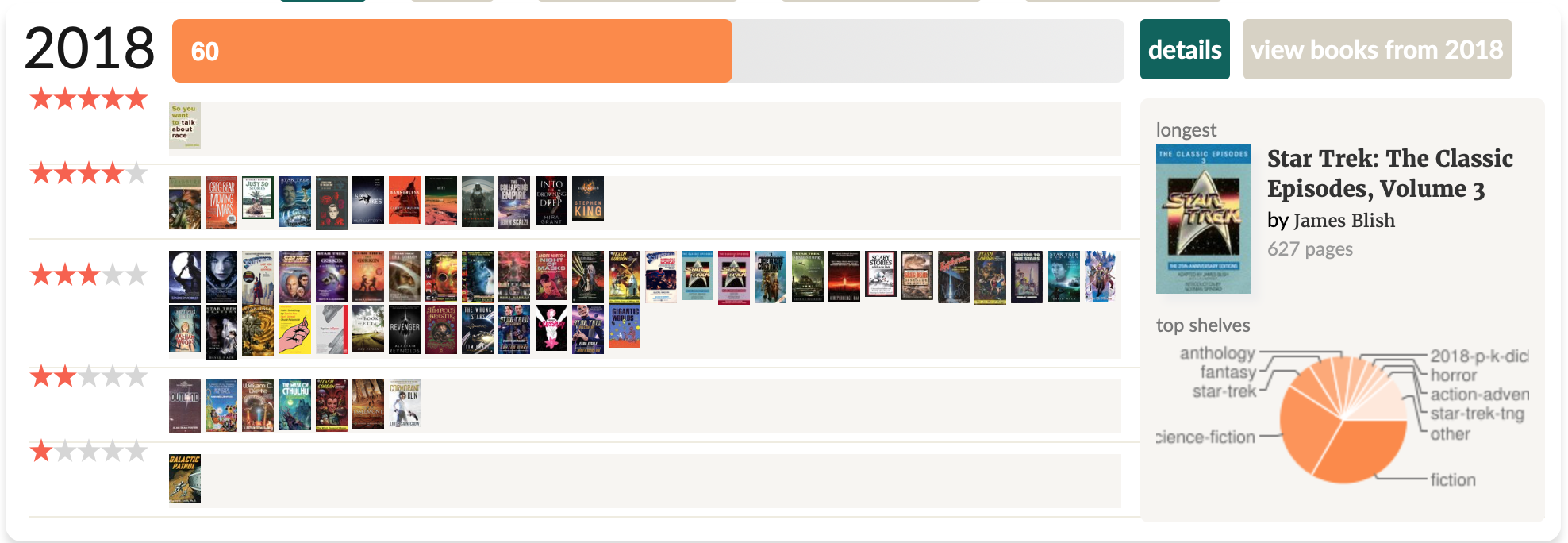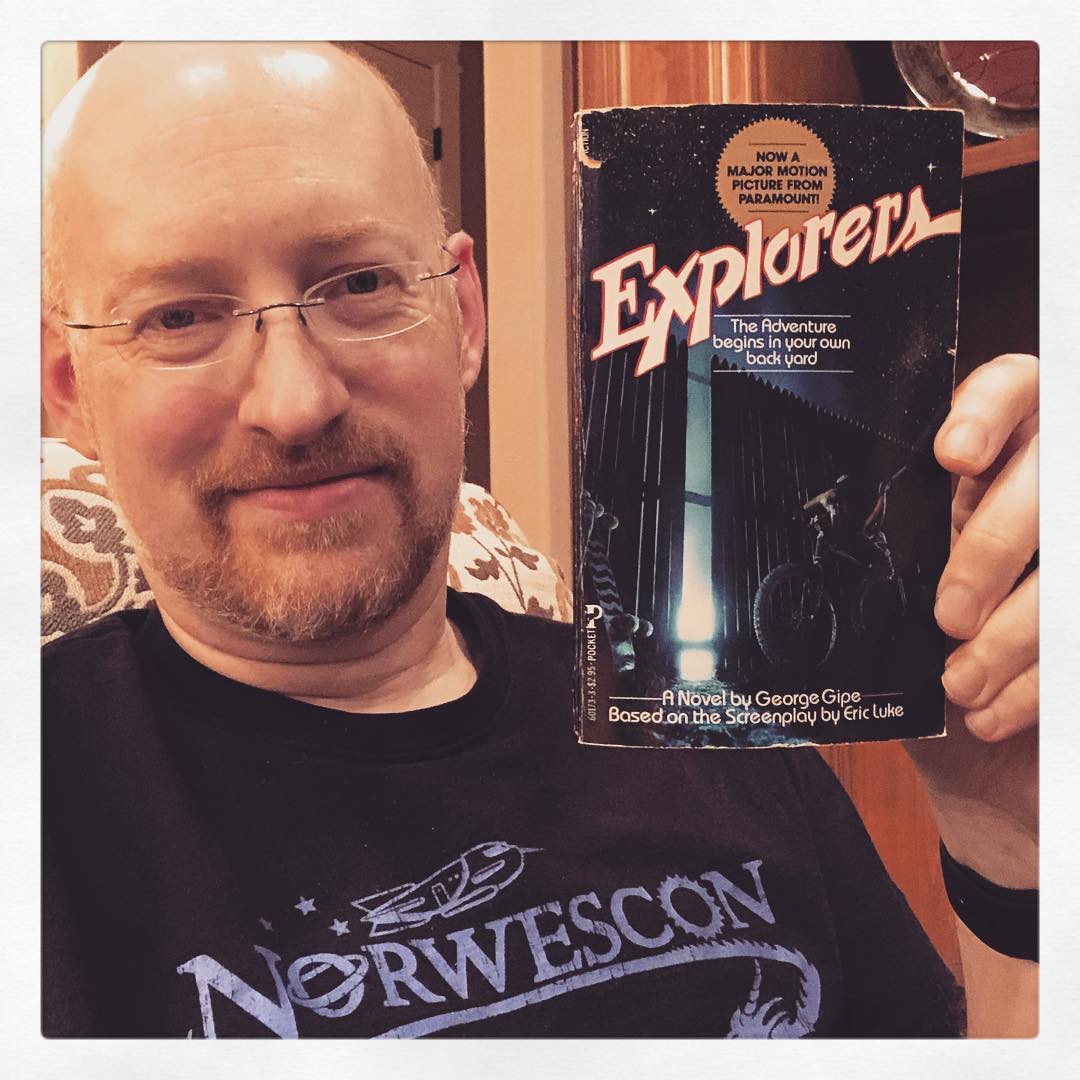Little Bo Peep has lost her sheep
And doesn’t know where to find them
She has one ring to bring them in
And in the darkness bind them
— @IceBergMama on Twitter
Enthusiastically Ambiverted Hopepunk
I read…a lot. Here’s where I ramble about books and printed media.
Little Bo Peep has lost her sheep
And doesn’t know where to find them
She has one ring to bring them in
And in the darkness bind them
— @IceBergMama on Twitter
Update: As blog posts can be ephemeral, rather than updating this post any further, I’m going to track my progress on my michaelhans.com site instead. If you stumble across this post and are interested in seeing how I’m doing, please check over there! This post will not be updated after March 5, 2019.
I’ve decided to work my way through reading all of the Best Novel Hugo Award winners over the coming year (or however long it actually takes), and will use this page to track my progress. While I’m starting with the most recent three winners, once I’m done with those, I’ll likely go back to the beginning and read forward chronologically. I actually expect this will take more than a single year, as I will definitely be pausing to read this year’s Philip K. Dick Award nominees when they’re announced as I do every year, for several of the entries on this list I may well pause to read prior books in whatever series they come from, and sometimes I might just want to read something else entirely. This is a marathon, not a sprint.
Once I’ve read an entry for this project, I’ll link the title to my brief review on Goodreads.
Key:
✓ = I read it at some point in the past, though I may not remember exactly when. I will probably be re-reading these as I go.
✅ = I’ve read it for this project.
Current progress: 7/73 (9.59%)
Overall, 27/73 (36.99%)
✓✅ 1939 (Retro) T. H. White: The Sword in the Stone (read as book one of The Once and Future King)
✅ 1941 (Retro) A. E. van Vogt: Slan
✅ 1943 (Retro) Robert A. Heinlein (as Anson MacDonald): Beyond This Horizon
✅ 1946 (Retro) Isaac Asimov: The Mule (read as part two of Foundation and Empire)
1951 (Retro) Robert A. Heinlein: Farmer in the Sky
1953 Alfred Bester: The Demolished Man
✓ 1954 (Retro) Ray Bradbury: Fahrenheit 451
1955 Mark Clifton & Frank Riley: They’d Rather Be Right (also known as The Forever Machine)
1956 Robert A. Heinlein: Double Star
1958 Fritz Leiber: The Big Time
1959 James Blish: A Case of Conscience
✓ 1960 Robert A. Heinlein: Starship Troopers
✓ 1961 Walter M. Miller, Jr.: A Canticle for Leibowitz
✓ 1962 Robert A. Heinlein: Stranger in a Strange Land
1963 Philip K. Dick: The Man in the High Castle
1964 Clifford D. Simak: Here Gather the Stars (also known as Way Station)
1965 Fritz Leiber: The Wanderer
✓ 1966 (1) Frank Herbert: Dune
1966 (2) Roger Zelazny: …And Call Me Conrad (also known as This Immortal)
1967 Robert A. Heinlein: The Moon Is a Harsh Mistress
1968 Roger Zelazny: Lord of Light
1969 John Brunner: Stand on Zanzibar
1970 Ursula K. Le Guin: The Left Hand of Darkness
✓ 1971 Larry Niven: Ringworld
1972 Philip José Farmer: To Your Scattered Bodies Go
1973 Isaac Asimov: The Gods Themselves
✓ 1974 Arthur C. Clarke: Rendezvous with Rama
1975 Ursula K. Le Guin: The Dispossessed
1976 Joe Haldeman: The Forever War
1977 Kate Wilhelm: Where Late the Sweet Birds Sang
1978 Frederik Pohl: Gateway
1979 Vonda N. McIntyre: Dreamsnake
1980 Arthur C. Clarke: The Fountains of Paradise
1981 Joan D. Vinge: The Snow Queen
1982 C. J. Cherryh: Downbelow Station
1983 Isaac Asimov: Foundation’s Edge
✓ 1984 David Brin: Startide Rising
✓ 1985 William Gibson: Neuromancer
✓ 1986 Orson Scott Card: Ender’s Game
✓ 1987 Orson Scott Card: Speaker for the Dead
✓ 1988 David Brin: The Uplift War
1989 C. J. Cherryh: Cyteen
✓ 1990 Dan Simmons: Hyperion
1991 Lois McMaster Bujold: The Vor Game
1992 Lois McMaster Bujold: Barrayar
1993 (1) Vernor Vinge: A Fire Upon the Deep
✓ 1993 (2) Connie Willis: Doomsday Book
1994 Kim Stanley Robinson: Green Mars
1995 Lois McMaster Bujold: Mirror Dance
✓ 1996 Neal Stephenson: The Diamond Age
1997 Kim Stanley Robinson: Blue Mars
1998 Joe Haldeman: Forever Peace
1999 Connie Willis: To Say Nothing of the Dog
2000 Vernor Vinge: A Deepness in the Sky
✓ 2001 J. K. Rowling: Harry Potter and the Goblet of Fire
✓ 2002 Neil Gaiman: American Gods
2003 Robert J. Sawyer: Hominids
2004 Lois McMaster Bujold: Paladin of Souls
2005 Susanna Clarke: Jonathan Strange & Mr Norrell
2006 Robert Charles Wilson: Spin
2007 Vernor Vinge: Rainbows End
2008 Michael Chabon: The Yiddish Policemen’s Union
✓ 2009 Neil Gaiman: The Graveyard Book
2010 (1) Paolo Bacigalupi: The Windup Girl
2010 (2) China Miéville: The City & the City
2011 Connie Willis: Blackout/All Clear
2012 Jo Walton: Among Others
✓ 2013 John Scalzi: Redshirts
✓ 2014 Ann Leckie: Ancillary Justice
2015 Cixin Liu: The Three-Body Problem
✅ 2016 N. K. Jemisin: The Fifth Season
✅ 2017 N. K. Jemisin: The Obelisk Gate
✅ 2018 N. K. Jemisin: The Stone Sky
List of winners sourced from Wikipedia.
Personal goal for this year (or, well, however long it takes): Read every Hugo Award Best Novel (including Retro Hugos). To date, I’ve read 21 of the 73 (28%), but it’s been ages for some, so I might or might not re-read those as I go along.
Every year, I set myself a goal of reading at least 52 books over the course of the year — an average of one a week. This year I made it to 60 (plus getting started on what will be my first book of 2019). Here’s a quick overview…

Non-fiction: Very little. Just one, in fact, though it was a good one (my only five-star rating): So You Want to Talk About Race, by Ijeoma Oluo. Excellent, and highly recommended. No matter how good you think you are at being aware of your privilege (or lack thereof) in modern society, this book is likely to give you some very worthwhile, if often uncomfortable, things to think about.
Non-genre-fiction (where “genre” is shorthand — though, not very short, if you include this parenthetical — for science-fiction, fantasy, and horror): Once again, not much, and at least one of these could be considered genre fiction. Chuck Palahniuk’s Make Something Up: Stories You Can’t Unread, an anthology of short pieces, while often somewhat disturbing, as is often the case with Palahniuk’s work, definitely isn’t SF/F/horror. Rudyard Kipling’s Just So Stories are certainly fantastical, but I don’t think of them as part of the fantasy genre. Crossplay by Niki Smith is graphic novel erotica which is straightforward (though not entirely straight) real-world fiction, though it is set at an anime convention. Steven King’s Elevation could probably be categorized as SF, F, or horror, as it’s the story of a man who keeps losing weight (not physical substance, however, he just keeps weighing less and less)…but tonally, it’s really not any of the three. All three were quite good, though.
Quality genre fiction: A good amount. This year’s Philip K. Dick Award nominees were, as usual, a strong selection of works. The Book of Etta by Meg Elison is a very worthy successor to The Book of the Unnamed Midwife; Tim Pratt’s The Wrong Stars is fun and frequently funny; and Revenger by Alastair Reynolds is high-seas adventure in deep space. Mur Lafferty’s Six Wakes is an excellent locked-room murder mystery with clones; All Systems Red by Martha Wells has a wonderfully dangerous “murderbot” protagonist, After the Flare by Deji Bryce Olukotun does a fascinating job crafting SF inspired by African cultures and settings rather than the American/European sensibilities that I’m used to, and Carrie Vaughn’s Bannerless is a welcome shift into optimistic post-apocalyptic fiction, rather than the pessimistic doom-and-gloom that such settings usually employ. Outside of the PK Dick awards, I enjoyed Mira Grant’s killer mermaids in Into the Drowning Deep, the decline of galactic civilization in John Scalzi’s The Collapsing Empire, and the political and planetary maneuvering in Moving Mars by Greg Bear.
Fluff genre fiction: The rest. I have no qualms or reservations about my ability to enjoy a lot of science fiction (and some fantasy) that, objectively, really isn’t very good, but is enjoyable, non-taxing, and generally just fun easy reading. Often these take the form of cheesy old 30s/40s/50s/60s SF or 80s movie novelizations, but chief among these are the many Star Trek novels that I read. While there are some that are definitely good (and, yes, there are some that are definitely bad), for the most part, they’re simply an enjoyable escape into my “home” fandom, to an optimistic universe where we as a species (and in collaboration with other species) are better than we used to be, and actively working towards continuing that process to do and be better than before. It’s not a bad way to spend my down time.
Book sixty of 2018: Explorers, by George Gipe. ⭐️⭐️⭐️
